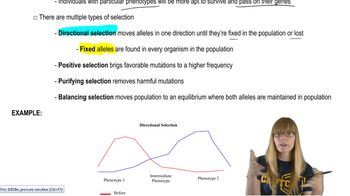Here are the essential concepts you must grasp in order to answer the question correctly.
Mutations
Mutations are changes in the DNA sequence of an organism's genome. They can occur due to various factors, including environmental influences or errors during DNA replication. While many mutations are harmful or neutral, some can confer advantageous traits that enhance an organism's survival and reproduction, playing a crucial role in evolution.
Recommended video:
Natural Selection
Natural selection is the process by which certain traits become more common in a population due to their advantageous effects on survival and reproduction. Organisms with beneficial mutations are more likely to survive and pass these traits to their offspring, leading to gradual changes in the population over generations, which is a fundamental mechanism of evolution.
Recommended video:
Genetic Variation
Genetic variation refers to the diversity in gene frequencies within a population. It is essential for evolution because it provides the raw material for natural selection to act upon. Mutations contribute to genetic variation, allowing populations to adapt to changing environments and increasing their chances of survival in the long term.
Recommended video:
 Verified step by step guidance
Verified step by step guidance Verified video answer for a similar problem:
Verified video answer for a similar problem:

